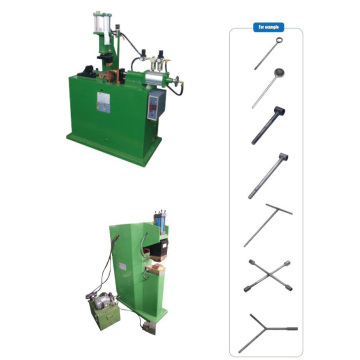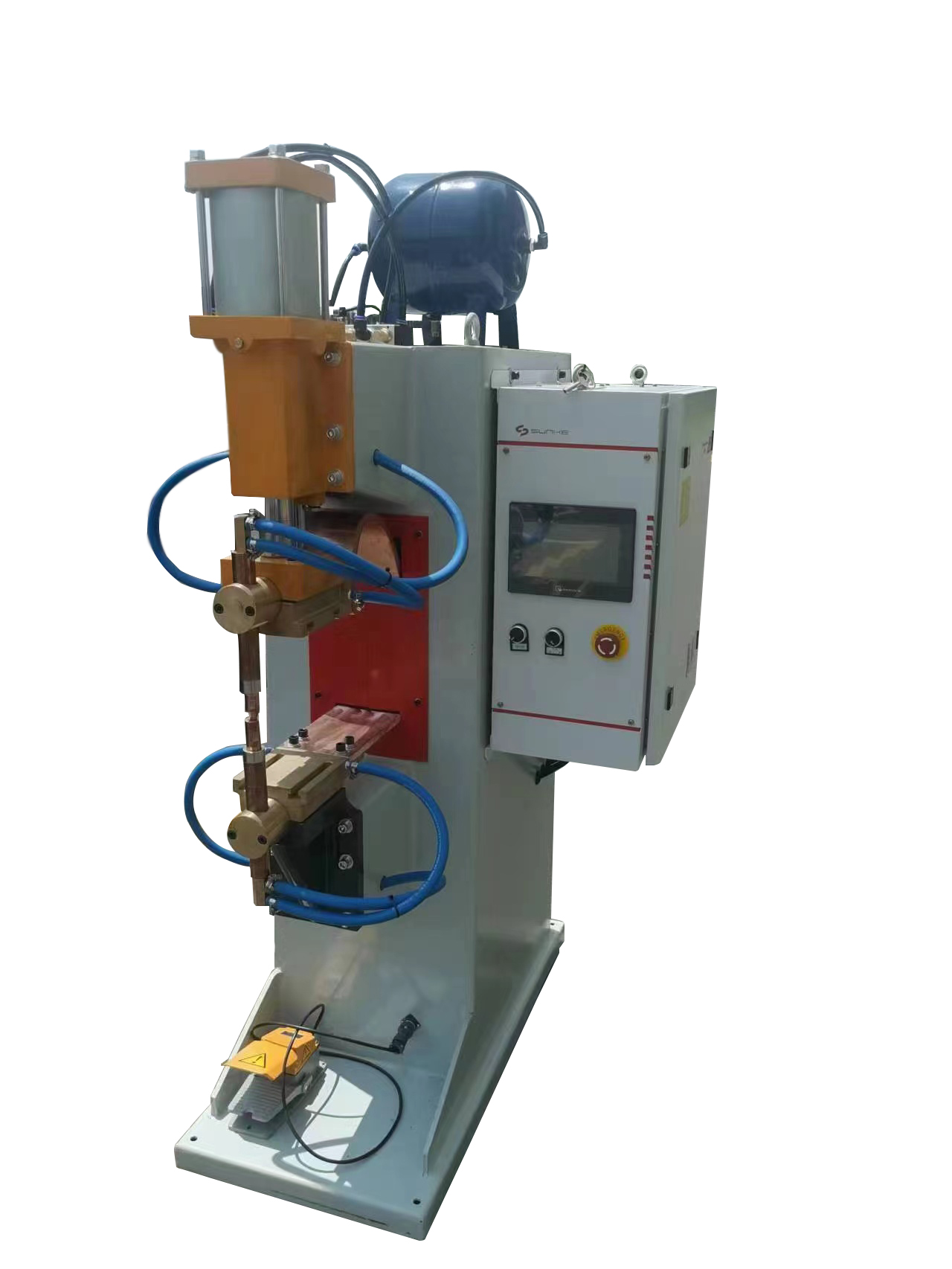
Hardware Manufacturing Industry
(Total 11 Products)-
Min. Order:1In the production process of T-wrenches, the Welding quality directly determines the strength and durability of the wrenches. The T-Spanner Welding Machine, with its unique performance designed specifically for the structure of T-wrenches, has...
-
Min. Order:1As a commonly used tool in mechanical maintenance and industrial installation, the Welding quality of the Cross part of the cross wrench is the key to determining its service life. The Cross Spanner Welding Machine, with targeted technical design,...
-
Min. Order:1In the production and manufacturing of Water tanks, the sealing and firmness of weld seams are the core factors determining the quality of water tanks. The Water Tank Seam Welding Machine, with its outstanding performance specially designed for seam...
-
Min. Order:1In the production and manufacturing of Industrial shelves, the firmness and efficiency of Welding are the keys to ensuring the load-bearing capacity and production progress of the shelves. The Industrial Shelf Spot Welding Machine, with its...
-
Min. Order:1In the production and manufacturing of Gas springs, the Welding quality is directly related to their supporting performance and service life. The Gas Spring Welding Machine, with its excellent performance specially designed for gas spring welding,...
-
Min. Order:1In the precise process of Elevator manufacturing, the Welding quality of the Step Arc Plate directly affects the safety and stability of elevator operation. The Arc Plate Elevator Step Welding Machine, with its outstanding performance specially...
-
Min. Order:1In the production and manufacturing of Security doors, the Welding quality of reinforcing parts is the key to ensuring the anti-theft performance of the Door body. The Security Door Reinforcement Welding Machine, with its outstanding performance...
-
Min. Order:1In the production and processing of spars, the accuracy and firmness of the Welding process directly affect the performance of the spars. The Bobbin Projection Welding Machine, with its outstanding performance designed for SPAR projection welding,...
-
Min. Order:1In the production of various equipment Foot pedals, the accuracy, efficiency and stability of welding directly affect the user experience and safety of the products. With the outstanding performance of automation, Automatic Foot Pedal Welder has...
-
Min. Order:1In the field of Container manufacturing, the quality and efficiency of Bracket Welding are directly related to the stability of the overall structure. The Container Bracket Welding Machine, with its outstanding performance specially designed for...
-
Min. Order:1In the vast field of metal Welding, various welding equipment perform their respective duties. Among them, the copper-Aluminum Butt Welding Machine, with its outstanding performance in welding dissimilar metals such as Copper and Aluminum, has...
In the Hardware Manufacturing Industry, resistance welding machines are indispensable core equipment. Operating on the "resistance heat generation + pressure bonding" principle (derived from Joule's law), they efficiently join metal components, playing a key role in producing hardware products like fasteners, tools, daily hardware, and structural parts. Their performance directly impacts the production efficiency, product quality, and cost control of hardware enterprises.
Wide-Ranging Applications in Hardware Manufacturing
Fastener Production: For bolts, nuts, and rivets, projection resistance welders are widely used. When manufacturing combined bolts (e.g., bolt heads with washers), these machines concentrate heat at the pre-formed projections of the components, using 15-30kA current and 300-800N pressure to achieve firm bonding. This ensures the fasteners have high shear strength (≥400MPa) and avoids loosening during use, meeting the needs of construction and machinery hardware.
Hand Tool Manufacturing: In making pliers, wrenches, and screwdrivers, spot resistance welders connect handles (often plastic-coated metal) to tool heads. They precisely control welding parameters—10-20kA current and 150-400N pressure—to form strong joints without damaging the plastic coating. The welding time is limited to 20-50ms, ensuring efficient production and consistent tool performance.
Daily Hardware Processing: For items like stainless steel kitchen racks and bathroom hangers, seam resistance welders are ideal. They create continuous, airtight welds on the joints of metal frames (e.g., 0.8-2mm thick stainless steel tubes), with welding speed reaching 1-3m/min. This not only enhances the structural stability of the hardware but also ensures a smooth, aesthetically pleasing weld surface, meeting consumer demands for both functionality and appearance.
Structural Hardware Fabrication: In manufacturing steel brackets and hinges for furniture or construction, multi-point resistance welders are employed. They can weld multiple joints simultaneously, using 25-45kA current to ensure each joint has sufficient strength. This reduces production time by 40% compared to single-point welding, adapting to the large-scale production needs of structural hardware.
Core Advantages for the Hardware Manufacturing Industry
High Production Efficiency: Resistance welding machines complete a single weld in 10-50ms, and automated lines integrated with these machines can produce 5,000+ hardware pieces per hour, far exceeding manual welding efficiency and meeting the industry's mass-production requirements.
Superior Product Quality: Precise control of current, time, and pressure ensures uniform weld strength, reducing the defect rate to below 0.5%. This is crucial for hardware products that require high reliability, such as load-bearing brackets and safety fasteners.
Cost-Effectiveness: No consumables like welding wire or protective gas are needed, cutting material costs. Additionally, the machines have low maintenance requirements, with key components lasting 8-15 months, significantly lowering long-term production costs for hardware enterprises.
Strong Material Adaptability: They can weld various metals commonly used in hardware, including carbon steel, stainless steel, and aluminum alloys, supporting the production of diverse hardware products and adapting to the industry's material diversity.
Future Development Trends
Intelligent Integration: Future resistance welding machines will be equipped with AI-powered vision systems and sensors to automatically detect hardware component sizes and material types, adjusting welding parameters in real time. This minimizes human errors and improves production accuracy, especially for small, precision hardware.
Energy Conservation: With the Hardware Manufacturing Industry's focus on green production, machines will adopt advanced inverter technology, reducing energy consumption by 35% compared to traditional models. This aligns with global environmental protection goals and lowers enterprises' energy costs.
Flexible Production: To meet the trend of customized hardware, resistance welding machines will develop modular designs. By replacing different welding heads and adjusting parameters quickly, they can handle small-batch, multi-variety hardware production, expanding the application scope of hardware enterprises.
Resistance welding machines are the driving force behind the modernization of the Hardware Manufacturing Industry. As technology advances, they will continue to optimize efficiency, quality, and sustainability, providing solid support for the industry's continuous development.

Hardware Manufacturing Industry
The hardware manufacturing industry is a core basic industry for the production of metal components, fasteners and tools, covering three major fields: building hardware, mechanical parts and daily tools. With the transformation towards intelligent manufacturing, the industry is upgrading from traditional contract manufacturing to high-precision, customized and automated directions, becoming a key support for the industrial chains of automobiles, electronics, home furnishings, etc.










